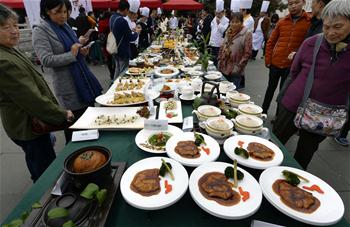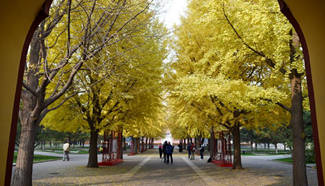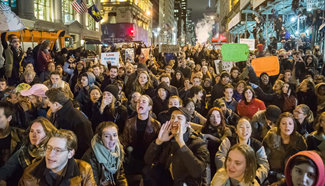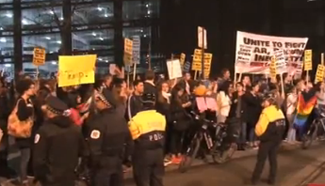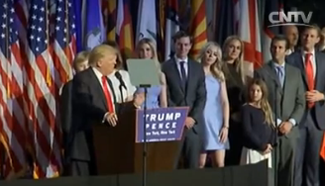DAMASCUS, Nov. 10 (Xinhua) -- The Syrian government and various opposition parties have expressed different opinions over the winning of Donald Trump in the U.S. presidential election, with each having different wishes from the new U.S. president.
For the Syrian government, wishes were that the United States under Trump's administration could be an "effective member" in the battle on terrorism, as Damascus deems all armed insurgents and the political opposition supporting them as terrorists.
"Syria doesn't interfere in the results of the U.S. elections, and what matters to the Syrians is the policy adopted by the new president," Bouthaina Shaaban, a senior advisor to Syrian President Bashar Assad, said in the first official Syrian response to the election of Trump, cited by pro-government al-Watan TV on Thursday.
Shaaban further remarked that Damascus is ready to cooperate with Washington if Trump's policies "were in harmony with our aspirations."
Shaaban's cautious wishes came as several segments of the Syrian society, mainly those supporting President Assad, expressed relative reliefs with U.S. Republican Trump winning the U.S. presidential election.
Big part of the relief is due to Trump's previous remarks about his will to cooperate with Russia in the war on terrorism, and thus a possible cooperation with the government of President Assad.
"When you think about it, wouldn't it be nice if we got along with Russia?" Trump said in July. "Wouldn't it be nice if we got together with Russia and knocked the hell out of IS (the Islamic State)?"
Another aspect that encourages the Syrians to feel good about Trump's winning is his desire not to interfere in other countries' internal affairs.
The Syrian government has always complained of the U.S. foreign policy toward Syria and regional issues, as President Barack Obama and even Hillary Clinton always showed a tendency toward backing the rebels in Syria against the Syrian government, with repeated calls for the ouster of Assad.
In her recent remarks, Shaaban said that "if his (Trump) policy was in line with the aspirations of Damascus, Syria is open to any cooperation with the United States and other countries that respect the sovereignty of nations and take into account the interest of the people."
Shaaban added that the U.S. interference in other countries' affairs has brought nothing but catastrophes, adding that Washington must adopt the policy of cooperation with other countries.
For his part, Muhammad Kheir, a Syrian parliamentarian, told al-Watan newspaper that the winning of Trump is much better than the would-be win of Clinton.
"If she had won, the situation in the region would be much worse in terms of the wars currently raging," he said, referring to the previous remarks by Clinton, who demanded a no-fly zone in Syria, which is seen by government loyalists as a plan to empower the rebels against the Syrian regime.
For the Assad loyalists, Trump had given positive vibes, when he expressed skepticism about the nature of the Syrian oppositions supported by Washington, while warning that the representatives of such oppositions may have been allied with the IS group.
Syrian political opposition parties reportedly congratulated Trump, with some members expressing their fears with Trump in the White House, following his positive remarks on Russia and the Syrian government.
Nasr al-Hariri, a member in the Saudi-backed Syrian National Coalition, said that remarks of Trump were "unacceptable," expressing fear of what could Trump do next.
Trump made it clear that one of his decisions when he becomes a president is to ban Muslims from entering the United States. He defended his stance as to protect Americans, not a religious discrimination.
Such remarks were not received at ease from the Syrian opposition which has been eager to topple Assad by all possible means, which explains their repetitive requests from Washington for more military aid to the rebels on ground.
Still, other Syrian opposition figures chose to be a bit more wishful.
Riad Hijab, a breakaway Syrian prime minister who became the central coordinator of the Western-backed High Negotiations Committee opposition, was said to have sent a letter of congratulation to Trump.
In his letter, Hijab said he was looking forward to more cooperation between the U.S. and the Syrian opposition to bring peace to the region and find "just and quick solutions to the suffering of the Syrian people."
For his part, Anas al-Abdah, the president of the Syrian National Coalition, wished that Trump could prove his critics wrong and play a more leading role than that of his predecessor by "undertaking a new and inclusive approach that primarily focuses on taking tangible steps to protect the Syrian civilians."
That was the case for the exiled opposition, which has taken a more radical approach in dealing with the Assad administration, by urging the United States and other Western powers for more military support to bring down Assad.
Unlike the exiled opposition, the home-based groups saw a glimpse of light with the election of Trump, in terms of cooperating with Russia to resolve the Syrian crisis politically.
Hasan Abdul-Azim, the general coordinator of the National Coordination Body, the largest Damascus-based political opposition group, told Xinhua that he wasn't expecting a great shift in the foreign policies of the United States with the advent of Trump.
However, he wished that Trump could do a change, even a little, in terms of "deepening the relations between Washington and Moscow to revive the political tracks for resolving the Syrian crisis."
Anas Joudeh, the head of the oppositional Damascus-based Nation Building Movement, agreed with Abdul-Azim that the foreign policies of the United States could still be relatively the same.
"Initially, the United States is governed by strategies, not the persons who come to the presidency, and such strategies are fixed and unchangeable, but every president can deal with it slightly differently," Joudeh said.
"The winning of Trump alone is not enough to see a big detente in terms of resolving the Syrian crisis, unless he cooperates with Russia, and if that happened, we could see a long-lasting ceasefire that constitutes the beginning of a political solution," he added.
Even Russia expressed optimism with the advent of Trump, with President Vladimir saying he would do everything he could to repair ties between the two countries.
"Russia is ready and wants to restore full-scale relations with the U.S.," Putin said. "We understand it will be a difficult path, but we are ready to play our part."


